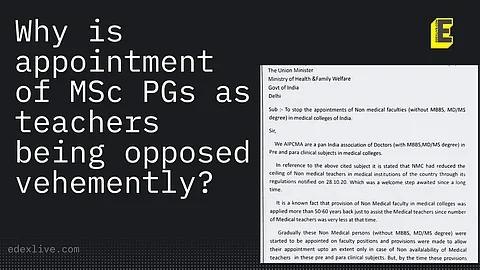

On Sunday, July 23, the medical fraternity gathered at Rajghat in Delhi for a mass agitation to protest unitedly against a similar cause. The protesting doctors raised the slogan ‘Save the future of Medical Education’ and ‘Let Doctors teach Doctors.’ There were nine organisations that participated, namely:
1) Indian Medical Association
2) Delhi Medical Association
3) Federation of Resident Doctor’s Association
4) National Medicos Association
5) National Association of Pharmacology & Therapeutics
6) Association of Medical Biochemists
7) Society of Clinical Anatomists
8) Indian Association of Medical Microbiologists
9) Association of Clinical Microbiologists
Under the superintendence of the All India Pre and Para Clinical Medicos Association (AIPCMA), they had marched from the Delhi Gate to Rajghat and peacefully demonstrated against an order that mandates an increase in the number of non-medical faculty members in the paraclinical subjects.
The organisations have vehemently started mass mobilisation within the medical fraternity so as to retrieve justice for them. Several student organisations from all parts of the country have started addressing letters to the Ministry of Health and Welfare (MoHFW) and the National Medical Commission (NMC) to judiciously revise the rules.
TEQ Regulations
A few doctors refer to the old regulation of TEQ (Teachers Eligibility Qualifications) 1998 which states, “...non-medical teachers may be appointed to the extent of 30% of the total number of the posts in the department” and say that just an MSc as a sufficient qualification to hire someone as a lecturer was not justifiable as this was passed to address the paucity of faculties back then. But the order was amended given the rising medical standards and the availability of sufficient doctors in the country.
The new amendment released in October 2020 decreased the percentage of non-medical staff as teaching faculties from 30 to 15 per cent and there was no provision that was made to appoint such faculty in the Department of Pharmacology and Microbiology, which was earlier allowed to the extent of 30% by the Medical Council of India. (MCI)
In June 2023, the rules were again revised against a few clauses of the TEQ regulations 2022, by the MoHFW after an appeal was submitted with the Supreme Court by Dr Ayan Das, General Secretary, National MSc Medical Teachers’ Association (NMMTA). The order stated that, “appointment of non-medical faculty having MSc qualifications may be allowed, for the time being in the Departments of Anatomy, Physiology, Biochemistry, Pharmacology and Microbiology to the extent of 30% of the total number of posts…”
Not only the percentage was doubled, but now, MSc graduates can teach Pharmacology and Microbiology, which caused a stir amongst the medicos.
Why not hire non-medicos?
Dr Abhinav Rajpurohit, President of AIPCMA, says that the order passed has rendered the role of NMC redundant. He further adds that the new regulations passed by the MoHFW superseded the role of NMC and overlooked the need of the doctors. Harking on maintaining the integrity of the profession, he said, “Medicine has different branches and different degrees for everything. A person pursuing a Bachelor of Ayurvedic Medicine (BAM) would not teach Allopathy or someone pursuing BSc in Nursing will not move on to perform surgeries.”
He says that the roles are clearly pre-defined to honour the sanctity of the profession. The new order clearly blurs the border between a medical expert and an MSc postgraduate (PG) degree holder, and this, in turn, will not be favourable for the budding doctors and neither for the people who will avail these doctors’ services.
Purohit, who is also a faculty member, says that they are not opposed to recruitment of non-medical teaching staff, and do not doubt the qualification of these PhD holders or these postgraduates. He opines that they just do not possess the required qualifications to teach doctors.
Another member of the medical fraternity, Dr Rahul Gupta, a member of the National Medicos Organisation and who has also been protesting against the imposed order, says that such non-medical faculties do not undergo any qualifier examination, or have any regulatory authority like NMC. “In the absence of such bodies, that keep the standard of our education in check, it is highly possible that these teachers will not be well-equipped in what they do.” His only demand is that the TEQ, that was in circulation previously, must be reinstated or it can be amended and improved.
Protests and appeals
Several online appeals have begun from the medical fraternity nationwide. Apart from the protests that are ongoing in many medical colleges in various parts of the country such as Himachal Pradesh, Jammu and Karnataka, an online appeal has started to send emails to several government bodies and top-ranking officials so their message is heard.
The email delineates how Applied Medicine is essential in the field of Anatomy, Physiology, Biochemistry, Pharmacology and Microbiology, which gives a student a fair idea of diagnosing the disease and prescribing suitable treatment for it or any surgical procedure, if required. It also states that without such knowledge students will not be able to correlate with the subject.
And with the revised competency-based medical education (CBME), it is pertinent for the students to study these paraclinical subjects with integration into the clinical subjects.
The AIPCMA President said that they plan to make it a pan-nation issue if their grievances are not addressed on time.
